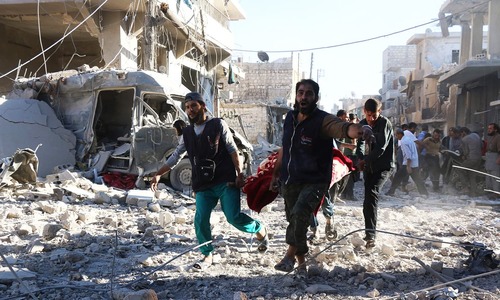WASHINGTON: US Defence Secretary Jim Mattis said on Thursday the use of chemical weapons in Syria is “simply inexcusable,” after a suspected poison gas attack that left more than 40 people dead.
The United States, France and Britain are finalising plans for an expected strike against the regime of Syrian President Bashar al-Assad. They blame Damascus for the alleged chemical attack on the town of Douma in the devastated Eastern Ghouta suburb of the capital.
“Some things are simply inexcusable, beyond the pale and in the worst interest of not just the chemical weapons convention but of civilization itself,” Mattis told the House Armed Services Committee.
He said a chemical attack had likely occurred and hoped inspectors would be in place within a week to prove it.
“I believe there was a chemical attack and we are looking for the actual evidence,” Mattis said.
World powers have threatened a strong response to Saturday’s attack, with French President Emmanuel Macron saying Thursday he had “proof” Syria’s government was behind it.
Syria and Russia have both denied the accusations, and the global chemical weapons watchdog said its team would begin its investigation on Saturday.
Lawmakers quizzed Mattis on what he made of President Donald Trump’s muddled messaging over Syria.
Last week, Trump said he wanted to pull out of the war-torn nation, but this week he has taunted Assad ally Russia with boasts of an impending missile strike.
Mattis insisted that Trump has not yet made a decision to strike Syria, after the president earlier had tweeted that action “could be very soon or not so soon at all!”
The Pentagon chief and other top security officials were due to head to the National Security Council, where he said he would present “various options to the president.” “We’re trying to stop the murder of innocent people. But on a strategic level, it’s [about] how do we keep this from escalating out of control,” Mattis said.
Buildup
Since Saturday’s attack in Douma, there has been a sustained military buildup in the eastern Mediterranean.
A French frigate, British Royal Navy submarines laden with cruise missiles and the USS Donald Cook, an American destroyer equipped with Tomahawk cruise missiles, have all moved into striking range.
Several lawmakers grilled the Pentagon chief on the legal authorities the military has for action in Syria beyond the remit of its current mission, which is to work to destroy the so-called Islamic State group.
The Pentagon is currently working under war powers granted in the aftermath of the September 11, 2001 attacks, even though operations across the Middle East have morphed broadly since those early days of seeking to destroy Al-Qaeda.—AFP
Our correspondent adds: Days after alleged chemical weapons attack in the Damascus suburb of Douma, the United Nations Security Council failed to adopt two competing resolutions that would have established a mechanism to investigate use of such weapons in Syria, as well as another concerning a fact-finding mission in the war-torn country, a UN statement here said.
Had one of the two mechanisms proposed in the drafts been approved, it could have filled the vacuum left by the Organisation for Prevention of Chemical Weapons (OPCW)-UN Joint Investigative Mechanism (JIM) when its mandate expired last November,
The first draft considered on Thursday — penned by the United States — which would have established a new investigative mechanism for one year, as well as identify those responsible for the use of chemical weapons, was rejected owing to a negative vote from Russia.
The draft received 12 votes in favour, two against (Bolivia and Russia) and one abstention (China).
A negative vote — or veto — from one of the Council’s five permanent members — China, France, Russia, United Kingdom and the United States — blocks passage of a resolution.
Thursday’s meeting marked the twelfth time Russia has used its veto to block Council action on Syria.
Similarly, a competing draft — penned by Russia — which would have established the mechanism for one year as well but would have given the Security Council the responsibility to assign accountability for the use of chemical weapons in Syria, was also not adopted.
This draft received six Council members’ votes in favour (Bolivia, China, Ethiopia, Equatorial Guinea, Kazakhstan and Russia), seven against (France, the Netherlands, Peru, Poland, Sweden, United Kingdom and United States) and two abstentions (Cote d’Ivoire and Kuwait).
The Council rejected a third text — also proposed by Russia — which concerned the work of the OPCW Fact-Finding Mission (FFM).
The draft received five votes in favour (Bolivia, China, Ethiopia, Kazakhstan and Russia), four against (France, Poland, the United Kingdom and the United States), and six abstentions (Cote d’Ivoire, Equatorial Guinea, Kuwait, the Netherlands, Peru, and Sweden).
Ahead of the Security Council meetings today, UN Secretary-General António Guterres had repeated his call on 15-member body to “find unity” on the issue of use of chemical weapons in Syria and ensure accountability.
“The norms against chemical weapons must be upheld. I appeal to the Security Council to fulfil its responsibility and find unity on this issue,” he said.
“I also encourage the Council to redouble its efforts to agree on a dedicated mechanism for accountability.”
Published in Dawn, April 13th, 2018













































